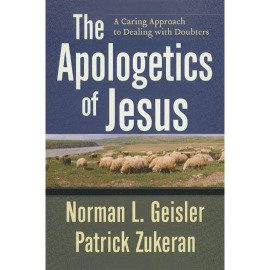Islam is a global threat unlike anything ever seen before in the history of the world. Its frighteningly different paradigm of conquest and disrespect for any non-Muslim people and cultures needs to be grasped in order to deal with it. When contrasted with the biblical worldview of Christianity, Islam presents a radically different view of God and mankind. Kerby Anderson highlights some of the radical differences between the Christianity of the Bible and the Islam of the Koran.
Islam and the Clash of Civilizations
Islam is a seventh century religion. For a moment, think about that statement. I doubt anyone would consider Christianity a first century religion. You might acknowledge that it began in the first century, but you wouldn’t probably describe it as a religion of the first century because the timeless principles of the gospel have adapted to the times in which they are communicated.
In many ways, Islam has remained stuck in the century in which it developed. One of the great questions of the twenty-first century is whether it will adapt to the modern era. Certainly many Muslims have done so, but radical Muslims have not.
Perhaps the leading scholar on Islam in this country is the emeritus professor from Princeton University, Bernard Lewis. This is what he had to say about Islam and the modern world:
Islam has brought comfort and peace of mind to countless millions of men and women. It has given dignity and meaning to drab and impoverished lives. It has taught people of different races to live in brotherhood and people of different creeds to live side by side in reasonable tolerance. It inspired a great civilization in which others besides Muslims lived creative and useful lives and which, by its achievement, enriched the whole world. But Islam, like other religions, has also known periods when it inspired in some of its followers a mood of hatred and violence. It is our misfortune that part, though by no means all or even most, of the Muslim world is now going through such a period, and that much, though again not all, of that hatred is directed against us.{1}
This certainly does not mean that all Muslims want to engage in jihad warfare against America and the West. But it does mean that there is a growing clash of civilizations.{2}
Bernard Lewis continues:
In the classical Islamic view, to which many Muslims are beginning to return, the world and all mankind are divided into two: the House of Islam, where the Muslim law and faith prevail, and the rest, known as the House of Unbelief or the House of War, which it is the duty of Muslims ultimately to bring to Islam.
It should by now be clear that we are facing a mood and a movement far transcending the level of issues and policies and the governments that pursue them. This is no less than a clash of civilizations—the perhaps irrational but surely historic reaction of an ancient rival against our Judeo-Christian heritage, our secular present, and the worldwide expansion of both. It is crucially important that we on our side should not be provoked into an equally historic but also equally irrational reaction against the rival.{3}
This is the challenge for the twenty-first century. Will Islam adapt to the modern world, or will there continue to be a clash of civilizations?
Muslim Intelligentsia
Not everyone accepts the clash of civilizations analysis. William Tucker, writing in the American Spectator, believes that the actual conflict results from what he calls the Muslim Intelligentsia.
He says that “we are not facing a clash of civilizations so much as a conflict with an educated segment of a civilization that produces some very weird, sexually disoriented men. Poverty has nothing to do with it. It is stunning to meet the al Qaeda roster—one highly accomplished scholar after another with advanced degrees in chemistry, biology, medicine, engineering, a large percentage of them educated in the United States.”{4}
This analysis is contrary to the many statements that have been made in the past that poverty breeds terrorism. While it is certainly true that many recruits for jihad come from impoverished situations, it is also true that the leadership comes from those who are well-educated and highly accomplished.
William Tucker believes that those who wish to engage in jihad warfare against the U.S. and the West bear a striking resemblance to the student revolutionaries during the 1960s on American universities. He calls them “overprivileged children” who he believes need to prove themselves (and their manhood) in the world. He also believes that “this is confounded by a polygamous society where fathers are often distant from their sons and where men and women barely encounter each other as young adults.”
Tucker says that our current conflict with Islam is not a war against a whole civilization. He point out that the jihad warriors are despised as much in their own countries as they are in the West. “Egyptians are sick to death of the Muslim Brotherhood and its casual slaughter. The war between Fundamentalists and secular authorities in Algeria cost 100,000 lives.”{5}
He concludes that we are effectively at war with a Muslim intelligentsia. These are essentially “the same people who brought us the horrors of the French Revolution and 20th century Communism. With their obsession for moral purity and their rational hatred that goes beyond all irrationality, these warrior-intellectuals are wreaking the same havoc in the Middle East as they did in Jacobin France and Mao Tse-tung’s China.”
Certainly we are facing a clash of civilizations between Islam and the West. But it is helpful to understand Tucker’s analysis. In any war it is important to know who you are fighting and what their motives might be. This understanding is one more important piece of the puzzle in the war on terrorism.
Extent of the Radical Muslim Threat
What is the extent of the threat from radical Muslims? This is hard to guess, but there are some commentators who have tried to provide a reasonable estimate. Dennis Prager provides an overview of the extent of the threat:
Anyone else sees the contemporary reality—the genocidal Islamic regime in Sudan; the widespread Muslim theological and emotional support for the killing of a Muslim who converts to another religion; the absence of freedom in Muslim-majority countries; the widespread support for Palestinians who randomly murder Israelis; the primitive state in which women are kept in many Muslim countries; the celebration of death; the honor killings of daughters, and so much else that is terrible in significant parts of the Muslim world—knows that civilized humanity has a new evil to fight.{6}
He argues that just as previous generations had to fight the Nazis and the communists, so this generation has to confront militant Islam. But he also notes something is dramatically different about the present Muslim threat. He says:
Far fewer people believed in Nazism or in communism than believe in Islam generally or in authoritarian Islam specifically. There are one billion Muslims in the world. If just 10 percent believe in the Islam of Hamas, the Taliban, the Sudanese regime, Saudi Arabia, Wahhabism, bin Laden, Islamic Jihad, the Finley Park Mosque in London or Hizbollah—and it is inconceivable that only one of 10 Muslims supports any of these groups’ ideologies—that means a true believing enemy of at least 100 million people.{7}
This very large number of people poses a threat that is unprecedented. Never has civilization has to confront such large numbers of those would wish to destroy civilization.
So what is the threat in the United States? Columnist Douglas MacKinnon has some chilling statistics. While he recognizes that most Muslims in the U.S. are peace-loving, he begins to break down the percentages. He says:
[I]f we accept the estimate that there are 6 million Muslim-Americans in our country, and 99% of them are law abiding citizens who are loyal to our nation, then that means that there may be—may be—1% who might put a twisted version of Islamic extremism before the wellbeing of their fellow Americans. When you stop to think that 1% of 6 million is 60,000 individuals, that then seems like a very intimidating one percent. Let’s go to the good side of extreme and say that 99.9 percent of all Muslim-Americans would never turn on their own government. That would still leave a questionable 1/10th one percent—or 6,000 potential terrorist sympathizers.{8}
You can see that even the most conservative estimate of possible jihad warriors in this country results in a scary scenario for the future.
Women in Islam
One of the areas where Islam has had difficulty in adapting to the modern world has been in its treatment of women. While some Muslim leaders actually claim that Islam actually liberates women, contemporary examples prove otherwise. Women who lived under Taliban rule in Afghanistan or who live under Sharia law in many Muslim countries today do not enjoy equal rights.
While it is true that many Muslims do respect and honor women, it is not true that those ideas can be found in the Qur’an. Here are just a few passages that illustrate the way women are to be treated. According to the Qur’an, women are considered inferior to men: “Men have authority over women because God has made the one superior to the other” (Sura 4:34). The Qur’an also restricts a woman’s testimony in court. According to Sura 2:282, her testimony is worth half as much as that of a man.
Polygamy is sanctioned in Islam, and practiced in many Muslim countries. Sura 4:3 says, “If we fear that ye shall not be able to deal justly with the orphans, marry women of your choice, two or three or four; but if we fear that ye shall not be able to deal justly with them, then only one, or a captive that your hand possess, that will be more suitable, to prevent you from doing injustice.”
Women in many Muslim countries cover their faces. The justification for that can be found in the Qur’an that teaches that women must “lower their gaze and guard their modesty: that they should not display their beauty and ornaments except what must ordinarily appear thereof: that they should draw their veils over their bosoms and not display their beauty except to their husbands, their fathers” (Sura 24:31).
Women in many Muslim countries cannot leave their house alone. Again, this is part of Islamic law. It states that a “husband may forbid his wife to leave the home.”{9} It also places other requirements. For example, “a woman may not leave the city without her husband or a member of her unmarriageable kin accompanying her, unless the journey is obligatory, like the hajj. It is unlawful for her to travel otherwise, and unlawful for her husband to allow her to.”{10}
Not only was this practiced in Afghanistan under the Taliban, it is found in countries like Saudi Arabia. In that country, women cannot drive nor can they leave their home without being accompanied by a male family member. Amnesty International reports that women in Saudi Arabia “who walk unaccompanied, or are in the company of a man who is neither their husband nor close relative, are at risk of arrest on suspicion of prostitution” or other moral offenses.{11}
Church and State in Islam
Islam and the West differ on many fundamental issues, but one of the most significant is whether the institutions of church and state should be separated. Hundreds of years of Western tradition have demonstrated the wisdom of keeping these institutions separated and the danger that ensues when the ecclesiastical and civil institutions are melded into one.
Bernard Lewis explains that no such separation exists in Islam:
In [the Islamic] world, religion embraces far more than it does in the Christian or post-Christian world. We are accustomed to talking of church and state and a whole series of pairs of words that go with them–lay and ecclesiastical, secular and religious, spiritual and temporal, and so on. These pairs of words simply do not exist in classical Islamic terminology because the dichotomy that these words express is unknown.{12}
Since the words (and the concepts) do not exist in Islam, it becomes difficult to see how to form democracies in the Muslim world. Essential to the functioning of these governments is a belief in the separation of powers. This would not only include a horizontal separation of powers (executive, legislative, and judicial), but a religious separations of powers (ecclesiastical and civil).
Chuck Colson says that “Islam is a theocratic belief system. It believes in not just a state church, but a church state. And so, it doesn’t advance like Christianity does. These are radically different views of reality.”{13}
This leads to another fundamental difference between Islam and Christianity. As we have discussed in previous articles,{14} Islam historically has advanced by force or compulsion. Chuck Colson puts it this way: “Christianity advances by love, it advances by winning people over, it advances by the grace of God; radical Islam advances by force.”{15}
Even within Muslim countries, Islam advances by compulsion. But it is important to point out that the Qur’an (2:256) says “there is no compulsion in religion.” But that really depends upon your definition of compulsion.
A closer look at Islamic law demonstrates a veiled threat that many believe is tantamount to compulsion. For example, Muhammad instructed his followers to invite non-Muslims to accept Islam before waging war against them. If they refused, warfare would follow or second class status. They would be inferiors in the Muslim social order and pay a special tax. This tax (known as the jizya) is required in Sura 9:29. If they pay it, they may live, but if they refuse to pay it, warfare will ensue.
While those of us in the West would consider this compulsion, the traditional Muslim interpretation of this would be that this would fit into the category of “no compulsion.”
Notes
1. Bernard Lewis, “The Roots of Muslim Rage,” Atlantic Monthly, September 1990, www.theatlantic.com/doc/prem/199009/muslim-rage.
2. See my article “The Clash of Civilizations,” Probe Ministries, 2002, probe.org/the-clash-of-civilizations/.
3. Lewis, “The Roots of Muslim Rage.”
4. William Tucker, “Overprivileged Children,” American Spectator, 12 Sept. 2006, spectator.org/46473_overprivileged-children/.
5. Ibid.
6. Dennis Prager, “The Islamic Threat is Greater than German and Soviets Threats Were,” 29 May 2006, http://tinyurl.com/yy7jcg.
7. Ibid.
8. Douglas MacKinnon, “Home grown terrorists,” 25 Aug. 2006, townhall.com/columnists/douglasmackinnon/2006/08/25/home-grown-terrorists-n1239612.
9. “Umdat al-Salik, (manual of Islamic law), m 10.4
10. Ibid., m 10.3
11. Amnesty International, “Saudi Arabia: End Secrecy End Suffering: Women,” www.amnesty.org/en/documents/MDE23/016/2000/en/.
12. Bernard Lewis, “Window on Islam,” Dallas Morning News, 9 July 2006, 4P.
13. Interview with Chuck Colson, “Worldviews in Conflict: Christianity & Islam,” Intercessors for America Newsletter, September 2006, Vol. 33, No. 9.
14. See Don Closson, “Islam and the Sword,” Probe Ministries, 2002. probe.org/islam-and-the-sword/.
15. Colson, “Worldviews.”
© 2007 Probe Ministries
 Actually, our invitation to Romania came about during our first trip to Hungary in 2008. Deanne and I became friends with students Alin and Iuliana Muntean and their 4–year–old daughter, Ruthie. Alin and Iuliana were mature beyond their years, serious students, and active evangelists in the various WOL outreaches. When we let them know that we were returning to Hungary this year, they invited us to Romania to teach as well! WOL Bible Training and Discipleship Center is only two years old but already has fourteen students. Needless to say, we were thrilled to accept their invitation.
Actually, our invitation to Romania came about during our first trip to Hungary in 2008. Deanne and I became friends with students Alin and Iuliana Muntean and their 4–year–old daughter, Ruthie. Alin and Iuliana were mature beyond their years, serious students, and active evangelists in the various WOL outreaches. When we let them know that we were returning to Hungary this year, they invited us to Romania to teach as well! WOL Bible Training and Discipleship Center is only two years old but already has fourteen students. Needless to say, we were thrilled to accept their invitation. Our four–day stay in Romania was a busy one. My class was made up of seven second–year students. I taught five hours a day on Apologetics and Worldviews as well as a one hour chapel that challenged our very capable translator, Wanna. She had an amazing ability to translate difficult abstract ideas from English into Romanian. Her skills became evident as the students asked pertinent questions that demonstrated their grasp of the topics. They were eager to receive the apologetics information on the reliability of the Bible, the deity of Christ, answers to the problem of evil and other topics. I also spent one evening helping them to think through a response to the local Jehovah’s Witnesses whom most had encountered. It was a lively discussion particularly when they realized they now have biblical answers to those false claims. Deanne sat in on the classes to interact with the students too. She prayed with the girls during a devotion and is continuing friendships with them via email.
Our four–day stay in Romania was a busy one. My class was made up of seven second–year students. I taught five hours a day on Apologetics and Worldviews as well as a one hour chapel that challenged our very capable translator, Wanna. She had an amazing ability to translate difficult abstract ideas from English into Romanian. Her skills became evident as the students asked pertinent questions that demonstrated their grasp of the topics. They were eager to receive the apologetics information on the reliability of the Bible, the deity of Christ, answers to the problem of evil and other topics. I also spent one evening helping them to think through a response to the local Jehovah’s Witnesses whom most had encountered. It was a lively discussion particularly when they realized they now have biblical answers to those false claims. Deanne sat in on the classes to interact with the students too. She prayed with the girls during a devotion and is continuing friendships with them via email.


 Our time in Hungary was also extremely rewarding. I had thirty students from nine different countries for a course on the cults covering the Mormons, Jehovah’s Witnesses, Scientology, Kabala, the Unification Church, and others. Thanks to the expertise of our translator Chris, the students seemed to enjoy the class and always had great questions. In an hour–long chapel I offered a response to the accusations by the so–called “New Atheists” that there is not enough evidence for God’s existence and that religion is the major source of wars in the world. I could tell that this information was new to the students. Afterwards, one student asked if he could meet with me. We ended up discussing for hours a variety of topics over two separate days. Since his list of questions about the Bible and Christianity was long, I agreed to work through the ones we didn’t cover and email my replies to him. It was encouraging to me that this young man is serious enough about his faith that he wants answers to important questions.
Our time in Hungary was also extremely rewarding. I had thirty students from nine different countries for a course on the cults covering the Mormons, Jehovah’s Witnesses, Scientology, Kabala, the Unification Church, and others. Thanks to the expertise of our translator Chris, the students seemed to enjoy the class and always had great questions. In an hour–long chapel I offered a response to the accusations by the so–called “New Atheists” that there is not enough evidence for God’s existence and that religion is the major source of wars in the world. I could tell that this information was new to the students. Afterwards, one student asked if he could meet with me. We ended up discussing for hours a variety of topics over two separate days. Since his list of questions about the Bible and Christianity was long, I agreed to work through the ones we didn’t cover and email my replies to him. It was encouraging to me that this young man is serious enough about his faith that he wants answers to important questions. The WOL ministry in Hungary is having a significant impact both in the Bible Institute and with evangelistic teams. While we were there, a team was invited to present a drama in Czech schools. Eleven boys met with one of the WOL staff members to talk about Christ after seeing the play, “Born to a Living Hope.” WOL is very serious about evangelism and has effective tools to share Christ in schools, prisons, and in open–air settings. The ministry also has ambitious plans for the 100–year–old historic structure on their property. They have just rebuilt the roof of the building and hope to build new classroom and office space on the third floor.
The WOL ministry in Hungary is having a significant impact both in the Bible Institute and with evangelistic teams. While we were there, a team was invited to present a drama in Czech schools. Eleven boys met with one of the WOL staff members to talk about Christ after seeing the play, “Born to a Living Hope.” WOL is very serious about evangelism and has effective tools to share Christ in schools, prisons, and in open–air settings. The ministry also has ambitious plans for the 100–year–old historic structure on their property. They have just rebuilt the roof of the building and hope to build new classroom and office space on the third floor.

